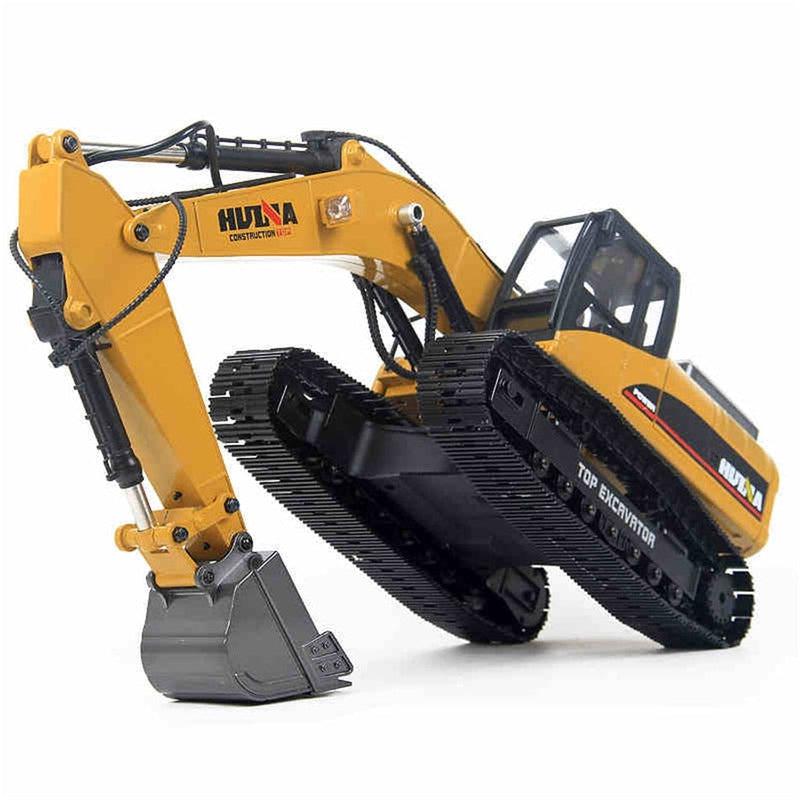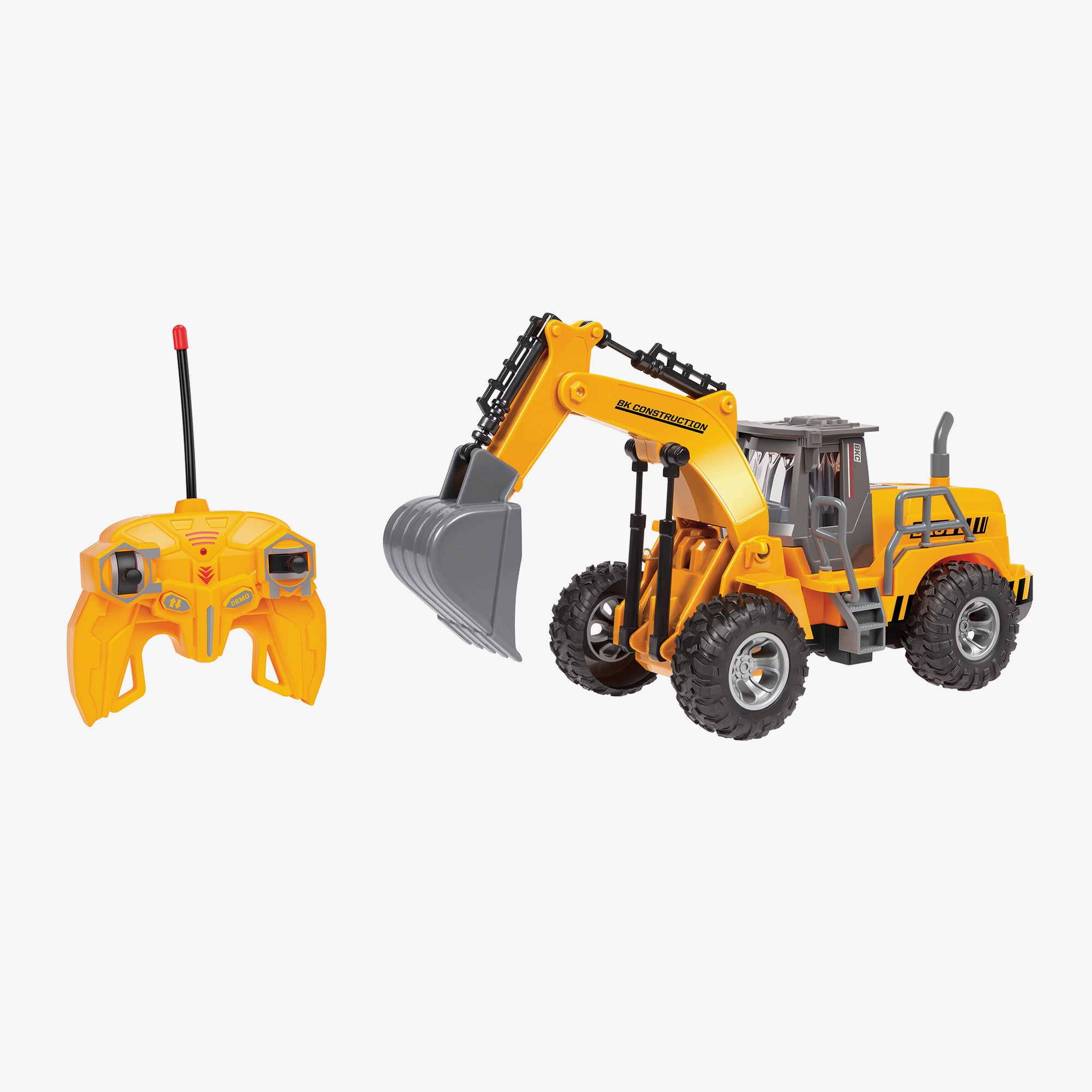Understanding Exactly How Excavator Works and Its Influence On Efficiency
Excavators play a necessary role in construction and mining operations, counting on an intricate interplay of mechanical and hydraulic systems. Their capability to perform a selection of tasks depends upon both their design and the modern technology integrated within. Comprehending these parts can substantially influence functional performance and productivity. As advancements continue to improve the sector, one need to take into consideration just how these adjustments will certainly affect future practices and performance.
The Basics of Excavator Mechanics

The Role of Hydraulic Equipments in Excavators
At the heart of excavator operation lies the hydraulic system, which plays a critical function in powering the equipment's movements and functions. This system makes use of pressurized hydraulic liquid to transfer energy, enabling different actions such as training, swinging, and digging. By taking advantage of the concepts of hydraulics, excavators can do tasks with remarkable accuracy and pressure, improving total operational efficiency.The hydraulic system includes crucial components, consisting of pumps, cylinders, and shutoffs, which collaborate to manage the circulation and direction of the liquid. When the driver involves the controls, the hydraulic fluid is routed to particular cyndrical tubes, converting the driver's commands into physical activity. This system enables for responsive and smooth actions, which are crucial in building and construction and excavation environments. double e volvo rc excavator. The effectiveness of the hydraulic system directly influences the efficiency and adaptability of the excavator, making it an essential element in contemporary excavation processes
Trick Components of an Excavator
Understanding the key components of an excavator is essential for realizing just how this powerful maker operates. An excavator consists of a number of substantial components, including the undercarriage, home, arm, boom, and bucket. The undercarriage gives stability and mobility, commonly featuring wheels or tracks to browse various surfaces. Your house consists of the engine and hydraulic systems, enabling the driver to regulate motion and power the machine. The boom extends from your home, enabling upright reach, while the arm connects to the container, helping with excavating and lifting operations.Additionally, the cab houses the operator, furnished with controls for precise handling. Each of these parts plays a crucial duty in the excavator's total performance, adding to its performance and efficiency on building sites. Comprehending these parts assists in maintaining and optimizing excavator efficiency, making sure tasks are finished securely and successfully.
Accessory Flexibility and Its Advantages
Attachment convenience is a necessary aspect of excavators, allowing operators to switch between numerous tools tailored for specific jobs. This adaptability not just boosts work efficiency however additionally contributes to cost-effectiveness by decreasing the need for several machines. Recognizing the different kinds of add-ons readily available can significantly affect the overall performance and functionality of an excavator on task sites.
Sorts of Attachments
While excavators are primarily acknowledged for their digging capacities, their true convenience hinges on the wide selection of accessories available. These attachments enhance the excavator's capability, permitting it to perform different tasks beyond excavation. Typical accessories consist of containers (for digging and scooping), hydraulic thumbs (for comprehending materials), and augers (for piercing holes) Grapples are utilized for managing and moving debris, while rippers can separate tough surface areas. Various other specialized attachments, such as plates and plows, allow excavators to adapt to specific work demands. This diversity not just enhances the device's utility across different industries, consisting of demolition, landscape design, and construction, yet additionally enables operators to tailor their equipment to fulfill certain job demands efficiently.
Enhanced Job Effectiveness
Taking full advantage of job performance is a key advantage of making use of different excavator attachments. Various attachments enable an excavator to carry out multiple tasks without needing to change equipment, saving important time and labor. For circumstances, utilizing a hydraulic hammer can damage concrete while a pail accessory can excavate soil, allowing a seamless operations. This flexibility reduces downtime related to devices modifications and improves productivity on-site. Furthermore, specialized add-ons boost precision in jobs such as grading or landscape design, bring about better end results. The capability to adjust to different task needs not only simplifies procedures however likewise reduces the demand for added machinery, making sure that jobs are finished promptly and properly. Generally, accessory convenience substantially adds to increased job efficiency in excavation work.
Cost-Effectiveness and Flexibility
Cost-effectiveness is a considerable advantage of using flexible excavator accessories. These attachments permit a solitary excavator to carry out several tasks, decreasing the demand for additional equipment and labor - double e volvo rc excavator. By switching between containers, hammers, and grapples, drivers can deal with numerous projects, from digging to demolition, thereby maximizing equipment utilization. This flexibility not just lowers functional expenses but also minimizes downtime connected with transforming devices. Additionally, the capacity to tailor excavators with specialized attachments boosts efficiency, as they can effectively take care of diverse tasks according to job needs. To wrap up, the mix of cost-effectiveness and flexibility in excavator add-ons adds to boosted operational performance and source allocation in construction and excavation jobs

Advanced Modern Technology in Modern Excavators
Modern excavators are progressively equipped with innovative innovation that transforms excavation procedures. Automation streamlines procedures, while improved fuel performance minimizes operational expenses. In addition, wise control systems enhance accuracy and security, marking a significant evolution in excavation devices.
Automation in Excavation Processes
As excavation modern technology progresses, automation has arised as an important part in improving effectiveness and accuracy on work sites. Modern excavators are outfitted with sophisticated automated systems that promote tasks such as grading, digging, and trenching with marginal driver treatment. These systems use sensors, GPS, and artificial intelligence formulas to guarantee exact placing and deepness control, considerably decreasing the margin for mistake. Furthermore, have a peek at this website automation permits operators to concentrate on strategic decision-making instead of hand-operated controls, resulting in improved productivity on the whole. Such advancements not only streamline workflows however also boost safety and security by reducing human mistake in complex operations. As a result, the integration of automation in excavation processes stands for a substantial improvement in building innovation, driving the sector towards higher effectiveness and performance.
Improved Gas Effectiveness
Developments in technology have also led to considerable improvements in fuel effectiveness for contemporary excavators. Modern makers are equipped with innovative engines that maximize power result while lowering gas intake. These engines utilize cutting-edge burning technologies, such as turbocharging and direct fuel shot, to improve efficiency and effectiveness. Furthermore, light-weight products in building and construction decrease overall weight, permitting less power expenditure throughout operation. The intro of variable rate controls makes it possible for drivers to adjust engine performance according to details jobs, further decreasing gas use. Therefore, these improvements not just lower operational prices but also add to environmental sustainability by reducing discharges. Overall, here are the findings improved gas performance in excavators is an important growth that strengthens productivity and financial feasibility in the construction industry.
Smart Control Solution
While drivers navigate significantly intricate work websites, wise control systems in excavators have actually arised as important tools for boosting effectiveness and accuracy. These sophisticated innovations make use of algorithms and sensing units to monitor numerous specifications such as lots weight, terrain problems, and operational performance. By immediately adjusting hydraulic functions, smart systems optimize equipment performance, leading to improved productivity and decreased endure components. Furthermore, drivers take advantage of instinctive user interfaces that supply real-time responses and diagnostics, permitting informed decision-making. This combination of technology not just streamlines procedures however also decreases human error, contributing to much safer workplace. As the construction industry remains to develop, smart control systems will play a crucial role fit the future of excavator efficiency and performance.
Enhancing Operational Effectiveness With Excavators
Excavators play an important role in boosting functional efficiency throughout various building and excavation tasks. Their convenience permits multiple tasks, including product, excavating, and lifting handling, which simplifies process and decreases the need for additional tools. With powerful hydraulic systems, excavators can execute durable tasks with precision, considerably reducing the moment required to full projects. The assimilation of sophisticated innovation, such as general practitioner and automated controls, better maximizes their procedure, making it possible for drivers to attain greater accuracy and reduce product waste. Furthermore, modern-day excavators are created to eat much less fuel and reduce emissions, adding to both expense savings and ecological sustainability. By making use of excavators properly, construction groups can enhance productivity, satisfy task deadlines, and improve overall website management. This multifunctionality and efficiency make excavators essential devices in the modern-day building and construction landscape.
The Future of Excavators in Building and Mining Industries
As the building and construction and mining industries develop, the future of look what i found excavators is poised for significant transformation driven by technological innovation and altering functional needs. Breakthroughs in automation and expert system are improving excavator capacities, enabling boosted accuracy and performance in procedures. Autonomous excavators are emerging, reducing the need for human treatment and minimizing the danger of accidents.Moreover, the combination of telematics and IoT technology enables real-time surveillance of machine performance and predictive maintenance, maximizing uptime. Green styles, including electric and hybrid designs, are getting grip, straightening with sustainability objectives within the industry.Additionally, making use of advanced materials and lighter designs improves fuel efficiency while maintaining efficiency criteria. As these fads progression, excavators will play an essential function in satisfying the enhancing needs for performance and safety in building and mining, inevitably changing functional landscapes.
Frequently Asked Inquiries
Exactly How Do Weather Influence Excavator Efficiency?

Weather problems considerably influence excavator efficiency, as rain and mud can hinder grip and security, while extreme temperatures might affect hydraulic systems. Operators has to adapt to these variables to guarantee excellent capability and safety and security during procedures.
What Precaution Should Operators Follow While Making Use Of Excavators?
Precaution for excavator operators consist of putting on ideal individual protective equipment, carrying out pre-operation assessments, guaranteeing proper communication with ground personnel, maintaining a secure distance from overhead threats, and sticking to recognized operational methods to avoid crashes.
Just How Often Should Excavators Be Kept for Ideal Efficiency?
Excavators ought to be preserved on a regular basis to assure peak efficiency, generally every 250 operating hours or as specified by the producer. Regular checks boost integrity, prevent unanticipated failures, and extend the life-span of the devices.
What Is the Ordinary Life Expectancy of an Excavator?
The average life-span of an excavator normally ranges from 10,000 to 15,000 hours of procedure. Variables affecting longevity include upkeep techniques, operating problems, and the high quality of the maker itself, impacting total efficiency and performance.

Can Excavators Operate Unequal Terrain Successfully?
Excavators can operate effectively on unequal surface due to their articulated styles and flexible tracks. These attributes permit them to maintain stability and grip, allowing reliable procedure in difficult atmospheres typically encountered in construction and landscape design tasks. Each of these elements plays a vital duty in the excavator's overall functionality, contributing to its efficiency and performance on construction websites. Making the most of work efficiency is a key benefit of making use of different excavator attachments. While drivers navigate progressively intricate work websites, wise control systems in excavators have emerged as essential tools for improving effectiveness and precision. Excavators play a vital role in improving functional effectiveness across different building and excavation tasks. Advancements in automation and synthetic knowledge are improving excavator abilities, allowing for boosted precision and effectiveness in procedures.